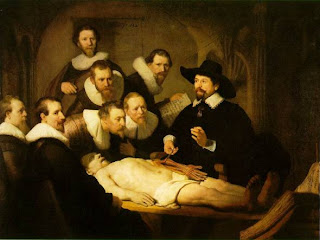Omnium Gatherum
 The Anatomy Lesson of Dr. Tulp. Rembrandt, 1632.
The Anatomy Lesson of Dr. Tulp. Rembrandt, 1632.An anatomy is an extended prose analysis of a subject, which by design (genre?) claims to be all-inclusive, exhaustive, complete. Most critics think of Robert Burton's 1621 tome The Anatomy of Melancholy when taking up the topic.
Northrop Frye in Anatomy of Criticism takes up the term "anatomy" because he addresses classification, announcing in his "Polemical Introduction" that his "approach is based on Matthew Arnold's precept of letting the mind play freely around a subject in which there has been much endeavor and little attempt at perspective" (3). Frye, too, is playing. How could he do anything but when he call the opening to his own anatomy "Polemical Introduction." How to read that title as anything but an ironic announcement? Ironic self-awareness like
Irony: So there’s this illusion of completeness, and the anatomist knows it. The desire is to try to become more and more detailed, working over time, amassing, arranging, digging deeper…excavating. It’s self-satirizing.
I have much to work out with this topic, but I want to put this idea against archival theory and the problem/paradox of the archive—the impossibility of its completion. The Internet is as much an “omnium gatherum” as an anatomy, accumulating through links/hypertext. Even the “hyper” in hypertext points to the impulse, the desire for some mythical, complete record, knowing the impossibility.
I read a terrific article today that led me to these thoughts--"Disfiguring the Body of Knowledge: Anatomical Discourse and Robert
So, it made me think of the painting with this post, and stranger yet, a Stephen Crane poem--
I saw a man chasing the horizon;
Round and round they sped.
I was disturbed at this;
I accosted the man.
"It is futile," I said,
"You can never---"
"You lie," he cried,
And ran on.
